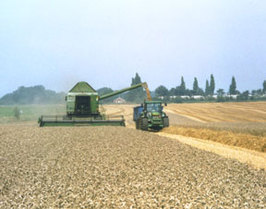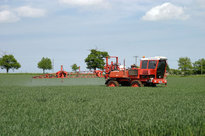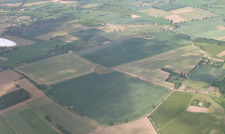Arable

The arable and livestock enterprises complement each other with arable cropping producing cattle feed and animal bedding, and manure from livestock contributing to the high fertility.
Some 95 per cent of the feed for the cattle is grown on the farm. More than 8000 tonnes of grass and maize silage are made each year, and stored in a clamp covering an area the size of a football pitch.
On the arable 'upland' the farm is achieving high yields of the main arable crops — wheat, sugar beet and approximately 365 acres of maize for forage. Beckhithe have recently re-introduced Fodder Beet.
Wheat yields average around 9 tonnes / hectare (3.6 tonnes /acre), the farm record was an average wheat yield of 4.65 tonnes/acre. The target for the sugar beet is 75 tonnes / hectare (28 tonnes/acre) of clean beet. The farm's quota of 6100 tonnes of beet is equivalent to more than 1.25million 1kg (2.2 lb) bags of sugar.
Some 95 per cent of the feed for the cattle is grown on the farm. More than 8000 tonnes of grass and maize silage are made each year, and stored in a clamp covering an area the size of a football pitch.
On the arable 'upland' the farm is achieving high yields of the main arable crops — wheat, sugar beet and approximately 365 acres of maize for forage. Beckhithe have recently re-introduced Fodder Beet.
Wheat yields average around 9 tonnes / hectare (3.6 tonnes /acre), the farm record was an average wheat yield of 4.65 tonnes/acre. The target for the sugar beet is 75 tonnes / hectare (28 tonnes/acre) of clean beet. The farm's quota of 6100 tonnes of beet is equivalent to more than 1.25million 1kg (2.2 lb) bags of sugar.
|
Cantley was in fact the first UK factory to be successful in producing sugar, developed by Dutch capital and expertise and opened in 1912. It was the Dutch who also once owned the land around Cantley and Reedham, acquiring it in the 1920s when traditional Norfolk farmers were reluctant to grow sugar beet because it was a ‘new’ crop and was seen as a threat to fodder beet. Arable performance is monitored closely by the farm's agronomist who also advises on soil management and other cross compliance issues.
|
Above Philip Simons, farm agronomist of Prime Agriculture
Left Arable land at Buckenham enhanced with new hedgerows & 1.2km of Bridleway
|



